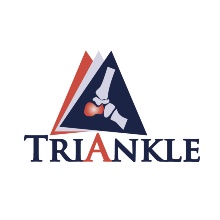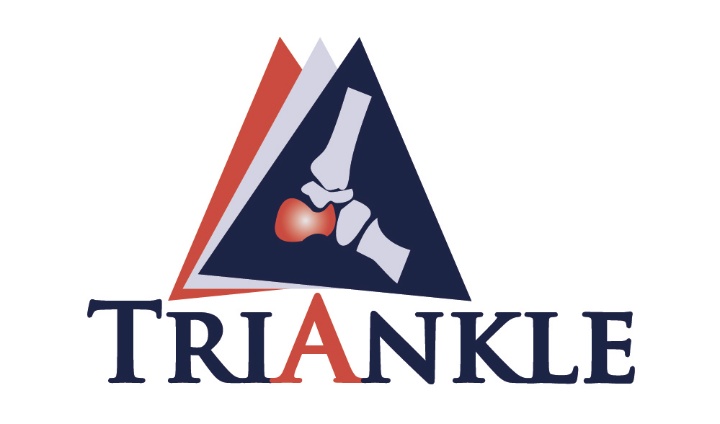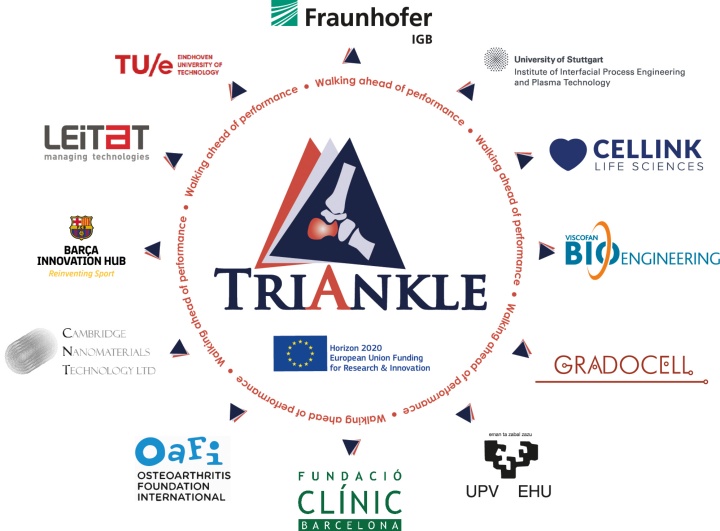- Research consortium is composed of 12 partners from 5 European countries and counts with a EU funding of €5.9M.
- TRIANKLE will provide fabrication of personalised implants for injured tendons or cartilages.
- At the University of Stuttgart, the Institute of Interfacial Engineering and Plasma Technology IGVP is researching the crosslinking chemistry and 3D printing of collagen and gelatin-based bio inks. The Fraunhofer IGB formulates and develops the bio-inks required for 3D printing of personalised implants.
- The main objective is to reduce the time of recovery down to 50% and increase the functionality ratios by 10-15%.
- The project aims at boosting competitiveness of the EU biomedical sector.
Regenerating ankle joints with collagen- and gelatine-based implants
Last week, on November 6, the grant agreement No: 952981 funded by the European Commission (Horizon 2020 Program) by which the TRIANKLE project comes into operation was signed.
The TRIANKLE consortium – made up of 12 European organisations, will develop 3D bioprinted personalised scaffolds for tissue regeneration of ankle joints. This ambitious research project in regenerative medicine comes with an overall budget of €5.9M and will be developed over 4 years, starting January 2021. The consortium aims to create innovative personalised collagen- and gelatine-based implants manufactured with 3D technology for patients with tendinopathies such as Achilles tendon partial ruptures and cartilage injuries.
The implants are to be manufactured from collagen or gelatine, biopolymers as they occur in the body, using innovative 3D printing processes. "By incorporating functional groups, we can optimally control the crosslinking of the biopolymers used and ensure that the collagens and gelatins also become dimensionally stable after the printing process," explains Dr. Alexander Southan, research group leader at the Institute of Interfacial Engineering and Plasma Technology IGVP at the University of Stuttgart. Here the IGVP works closely with the neighboring Fraunhofer Institute for Interfacial Engineering and Biotechnology IGB. "In order for the biopolymers to be processed together with the growth factors and the cells with a 3D printer, they must be flowable," adds Dr. Achim Weber from the Fraunhofer Institute for Interfacial Engineering and Biotechnology IGB in Stuttgart, one of the German research partners in the network. "We are therefore formulating and developing collagen- and gelatine-based bio inks that only become solid after printing by crosslinking the biopolymers."
"The Stuttgart project contribution on the processing of personalised bio inks for individualized medical products of the future fits in excellently with our work from application-oriented basic research to the transfer of knowledge into practice," says Prof. Dr. Günter Tovar, who has been acting director of the IGVP for five years.
A common and expensive health problem
Tendinopathies and osteoarthritis (OA) are extremely common, especially among the elderly, women and professional athletes. In addition to quality of life, both conditions substantially impact healthcare systems of economies (OA costs €76.5 billion in EU every year, while tendinopathies have an estimated worldwide expenditure above €140 billion).
Filling the gap of ineffective treatments
The project aims to fill the critical gap created by the lack of effective treatments currently available. None of the existing surgical or non-surgical alternatives have provided a successful long-term solution for patients, and often the treated tissues do not recover their complete strength and functionality. In this context, TRIANKLE’s objectives will be to reduce recovery time by 50% and, at the same time, increase the functionality ratios of the injured tissue by 10%-15%.
Partnership: From advanced research to potential market
TRIANKLE consortium consists of a team of 12 organisations covering the complete spectrum from advanced research to the market. Its main strength relies on the combination of highly skilled partners with proven track records in biomaterials for regenerative applications and 3D bioprinting technology with partners that are also devoted to social engagement and dissemination of results to healthcare professionals and, ultimately, potential patients. A total of 12 organisations from 5 different countries (Germany, Spain, Sweden, the Netherlands, and the United Kingdom) make up the TRIANKLE consortium. The partnership includes one industry partner (Naturin Viscofan GmbH), three SMEs (CELLINK AB, Cambridge Nanomaterials Technology, and Gradocell SL), two research centres (Fraunhofer Institute for Interfacial Engineering and Biotechnology IGB and Acondicionamiento Tarrasense Associacion), three universities (University of Stuttgart, Universidad del País Vasco and Eindhoven University of Technology), two non-profit organisations (Futbol Club Barcelona Asociacion FCB and Osteoarthritis Foundation International OAFI) and one healthcare institution (Fundacio Clinic per a la Recerca Biomedica). The TRIANKLE project coordinator is Naturin Viscofan GmbH.
TRIANKLE will contribute to unlocking the potential of innovative 3D printing technology for regenerative medical applications and ultimately enable the commercialization of 3D-printed personalised regenerative solutions. Furthermore, the innovation potential of TRIANKLE lies in the launching of the technological platform that will enable the development of future regenerative therapies of joint tissues in weight-bearing joints.
More info
About Horizon 2020
Horizon 2020 is the biggest EU Research and Innovation programme ever with nearly €80 billion of funding available over 7 years (2014 to 2020) – in addition to the private investment that this money will attract. It promises more breakthroughs, discoveries and world-firsts by taking great ideas from the lab to the market.
For more info: http://ec.europa.eu/programmes/horizon2020/en/what-horizon-2020
About TRIANKLE partners
Naturin Viscofan is the project coordinator of TRIANKLE. It belongs to the Viscofan Group, the worlwide leader in collagen production. Naturin Viscofan GmbH has developed and produced at industrial-scale collagen solutions that are applied in research, medical and food grade.
As a life-science company based in Sweden, CELLINK AB develops innovative technologies and products to create, understand and master biology, enabling scientists around the world to culture cells in 3D, perform high-throughput drug screening and engineer human tissues for regenerative medicine.
Fraunhofer IGB develops and optimizes processes, technologies, and products for health, sustainable chemistry, and the environment. In the TRIANKLE Project, the IGB will formulate and develop collagen- and gelatine-based bio-inks needed for 3D printing the implants.
The Institute of Interfacial Process Engineering and Plasma Technology IGVP at the University of Stuttgart develops new functional materials from bio-based and synthetic polymers. In the TRIANKLE project, the IGVP will do research on bio-ink crosslinking chemistry and 3D-printing of bio-inks.
NanoBioCel, research group of the University of the Basque Country, has a wide know-how in 3D-printing for tissue engineering and regeneration. They will develop controlled release drug delivery systems to produce functionalized scaffolds mimicking biological entities and stimulating cell-specific responses to lead to tissue regeneration and repair.
Eindhoven University of Technology (TU/e) is a technical university based in Eindhoven, the Netherlands. TU/e has nine departments including Mechanical Engineering, Applied Physics, and Biomedical Engineering.
Leitat is a private technical institute with more than 110 years of experience in industrial innovation processes. We transform technological and scientific results into economic and competitive value for our clients and collaborating entities through applied research and technical testing in the fields of chemistry, energy, environment, materials, engineering and life sciences. We rely upon our 330 highly skilled team members who deliver flexible solutions to face any industrial challenge.
FC Barcelona participates in the project through the Barça Innovation Hub, the club's sports innovation laboratory and knowledge platform that aims to improve the performance of its athletes and develop products and services that benefit not only the institution but also the sports industry and society in general. The tasks of the Club in the project consist of carrying out the preclinical evaluation of the bio-printed implants and designing patient’s engagement strategy, as well as promoting the communication and dissemination of the project.
OAFI is the Osteoarthritis Foundation International, the first and only worldwide foundation exclusively devoted to the people living with osteoarthritis. Created in October 2016 in Barcelona, the Foundation’s goal is to lead the fight against osteoarthritis by promoting education, prevention, treatment and research on those areas pertaining to joint health and to offer solutions to those suffering from this pathology so that they can feel accompanied, relieve their pain and improve their quality of life.
FCRB manages and promotes the research activities of the Hospital Clínic de Barcelona (HCB) that counts with medical professionals specialised in regenerative medicine and ethical experts in pre-clinical and clinical traslation.
Gradocell will lead the work package related to the ethical and regulatory aspects for the development of TriAnkle, both from the manufacturing point of view and for the future authorisation of the clinical trial. Gradocell SL is a consulting company providing technical, regulatory and quality advice, as well as support with the execution of product development projects in the field of Advanced Therapies.
CNT is specialised in consulting and collaborative R&D project management, including exploitation and IPR management. It will coordinate and exploitation activities and will define the business plan and networking with other related projects and EU initiatives.




